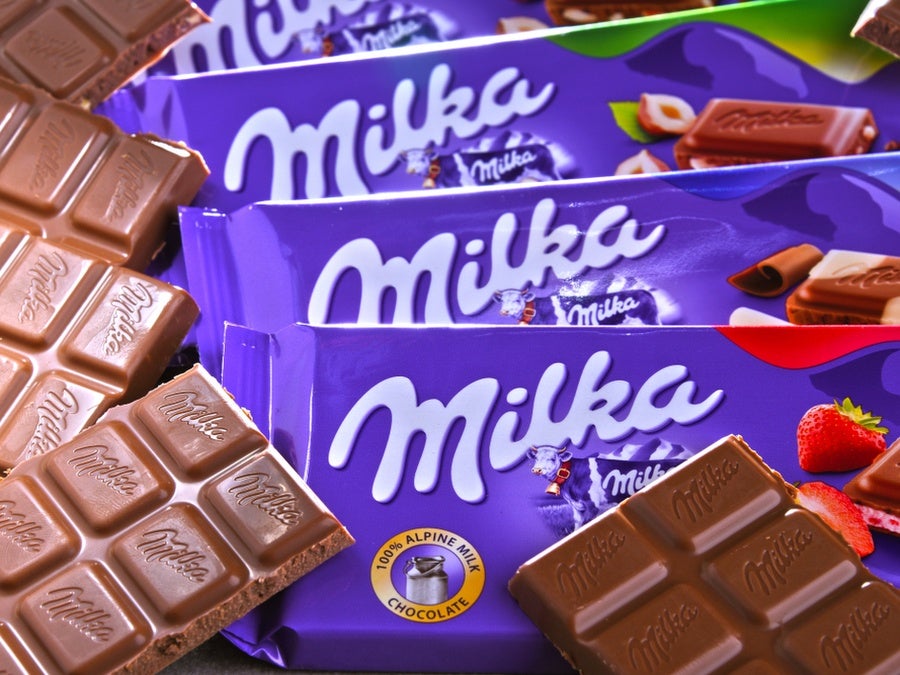
Consumers will have to get used to paying more for chocolate as cocoa remains at historical highs, Mondelez International’s CEO Dirk Van de Put has said.
While the head of one of the world’s largest confectionery and snacks makers is confident cocoa prices will eventually come down, Mondelez envisages further price increases of as much as 50% to compensate for the input-cost inflation.

Discover B2B Marketing That Performs
Combine business intelligence and editorial excellence to reach engaged professionals across 36 leading media platforms.
Nevertheless, as consumers continue to prioritise snacking, despite the cost-of-living environment, Van de Put predicts Mondelez’s chocolate volumes will weather the storm.
Cocoa was among the multiple food industry challenges manufacturers are facing that Van de Put discussed at the Consumer Analyst Group of New York (CAGNY) conference yesterday (18 February). Another, the Make America Healthy Again (MAHA) campaign introduced by President Trump, is also likely to result in price hikes across Mondelez’s portfolio should it have to “reformulate”.
“We believe cocoa over time will come down, not necessarily to the level it was in 2021. In the meantime, we’re doing significant price increases,” Van de Put said as he addressed the challenges.
“First views are that the elasticity is quite good in fact, and probably a little bit better than we would have expected. Consumers will need to get used to a chocolate that is 30%, 40%, 50% more expensive than it used to be because that’s what we’re going to see. But I do think volume will hold up.”

US Tariffs are shifting - will you react or anticipate?
Don’t let policy changes catch you off guard. Stay proactive with real-time data and expert analysis.
By GlobalDataTwo weeks ago, the Cadbury and Milka chocolate brand owner reported results for the 2024 financial year. While reported and organic growth were up 1.2% and 4.3%, respectively, at $36.4bn, volumes were down one percentage point. Mondelez took pricing of 5.3 percentage points over the 12 months.
Meanwhile, cocoa futures remain well above historical levels. Contracts for March delivery closed at $10,301 per metric tonne on the Intercontinental Exchange (ICE) in London yesterday. While that is off the record high of $12,931 reached in December, cocoa was trading around the $2,200 area in 2020.
“We have a clear strategy to navigate record input costs” from cocoa, Van de Put explained at the CAGNY event, outlining a strategy to address higher prices for the commodity.
One is using Mondelez’s revenue growth management (RGM) playbook. “We have reconfigured most of our chocolate portfolio to the right sizes and prices to not only manage near-term cost pressure, but to also continue accelerating growth,” the CEO said.
Cocoa sourcing, MAHA
Pricing is another element, along with “enhanced” marketing, delivering cost savings, including the use of AI, and “improving the resilience and stability of the cocoa supply chain”, Van de Put said.
“We plan to secure more and better quality cocoa through more direct sourcing programmes. Additionally, our signature sustainability sourcing programme, Cocoa Life, continues to work with farmers on the ground to improve agronomy practices and increased crop yields,” he explained.
“We’re also partnering with suppliers to help transition to more large-scale farming, while enhancing our processing practices and technologies to get more cocoa out of a single bean.”
Van de Put added that about 91% of Mondelez’s cocoa volumes sourced for its chocolate brands derive from Cocoa Life, which aims to “lift up the people and restore the landscapes where cocoa is growing”.
The global packaged food industry is grappling with multiple challenges, from the consumer environment, inflation pressures and the pricing impact on volumes, the rise of the GLP-1 weight-loss drugs and potential Trump tariffs.
Then there’s the potential clamp down on ultra-processed and not-so-healthy food and drinks under the new administration, and disruptions from the ongoing geopolitical conflicts.
Mondelez’s CEO was asked at CAGNY for his assumptions going forward amid the business challenges and whether they could have long-term implications for the food industry.
“I don’t think any of these will stick and say this industry has been changed forever. But we will have to deal with the size of these challenges, and most of it translates itself into cost pressures, which will bring its way to more pricing, I think, and it’s not an easy moment to price,” Van de Put explained.
“I do expect it will take us a few years to work our way through this.”
With respect to MAHA, he added that Mondelez could be required to “reformulate” its products, most likely around ingredients and colourants and such like.
“We think we can adapt our recipes relatively straightforward. It’s work that needs to be done, it’s cost that will come, but I also believe we can work our way through this,” Van de Put said.





